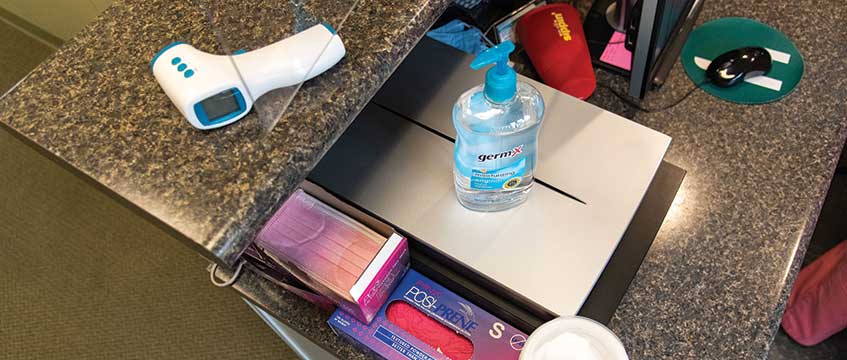Reconfiguring workspace for social distancing
Paul Burton addresses how to meet changing needs while complying with lease obligations and counting the costs.
As the UK tentatively moves toward a return to the office, landlords and tenants have much to consider when it comes to reconfiguring workspace to adhere to new social distancing guidelines.
For many, this new reality will mean reworking confined spaces with limited natural ventilation and awkward floorplates. Occupiers will need to alter fixtures and equipment, reconsider building services, and invest in new technology – all at a cost. Against a difficult financial backdrop, parties will need to fully understand their covenants and obligations.
Paul Burton addresses how to meet changing needs while complying with lease obligations and counting the costs.
As the UK tentatively moves toward a return to the office, landlords and tenants have much to consider when it comes to reconfiguring workspace to adhere to new social distancing guidelines.
For many, this new reality will mean reworking confined spaces with limited natural ventilation and awkward floorplates. Occupiers will need to alter fixtures and equipment, reconsider building services, and invest in new technology – all at a cost. Against a difficult financial backdrop, parties will need to fully understand their covenants and obligations.
Reconfiguring workspace
The extent of the premises demised by a lease will affect matters relating to repair, alterations and yielding up – what mechanical, electrical services and plant (M&E) does the premises include, and are kitchens, bathrooms, and door opening systems included, for example?
An occupier will usually be expected to meet certain obligations when it comes to repairs. A typical “full repairing and insuring lease” will obligate a tenant to keep the premises in good repair and condition, which can require works to be carried out even if there is no disrepair, and to put the premises into a good and tenantable condition (regardless of the condition at the outset). Further, in multi-let buildings, it is common for occupiers to be responsible for the M&E within and exclusively serving its premises (such as air conditioning).
Most leases will also contain a “compliance with laws” clause which will render the occupier liable to deal with consequences of any legislation, notices and other requirements of a competent authority relating to the condition or use of the premises. Any works the tenant is obliged to do will usually be without prejudice to any requirement to obtain necessary consents and permissions.
Occupiers may also be caught under user covenants specifying that premises may not be used in a manner which causes danger or nuisance – this may become more notable in the context of a multi-let building. Reasonable regulations may also be imposed, with which the tenants would be obliged to comply.
While consideration will need to be given to what alterations are permitted and whether any consent can be reasonably withheld, where works are required as a matter of law, the courts are likely to have extensive powers to override or modify such obligations if necessary.
Taking a long-term view
When it comes to the costs necessary for carrying out modifications to a workspace, tenants will also have to budget for the additional spend involved in obtaining any necessary consents for alterations and any associated delays, and for having works signed off by their landlord’s surveyors (who may be able to dictate what is done and by what method).
Occupiers should take care to ascertain the potential impact the works may have on their rent review. Whether the tenant is obliged to remove alterations and make good at the end of their lease is frequently a source of dispute and will turn on the provisions of the lease:
In the normal course, alterations will have to be reinstated at the end of the term, however landlords may agree to give notice to reinstate or that reinstatement only needs to occur where reasonably required.
In the absence of an obligation to reinstate, a tenant cannot be made to reinstate a lawful alteration.
While it may first appear illogical, works undertaken to comply with statute will not automatically be treated differently to other works for the purposes of such provisions.
Where a landlord decides that a tenant has left the property in a state that is not in accordance with its covenants (having regard to repair obligations and reinstatement provisions), then it can sue for breach of covenant.
Failure to comply with the above tenants’ covenants in the current context may have serious implications for occupiers who, for example, are looking:
to exercise a (typical conditional) break right;
for a statutory renewal; or
to assign or underlet premises where consent is required.
It should be further noted that, without specific legislation, the parties’ obligations under a lease would not be altered and the Coronavirus Act 2020 does not currently suspend the right to rents, only the right to forfeit the lease for non-payment until the moratorium ends.
Landlords may also have various self-help rights available where tenants have not undertaken works required under the lease, and will likely be able to recover (on a full indemnity basis) associated costs for doing so as a rent.
Tackling common areas
Most landlords will not be subject to covenants equivalent to the above in relation to common parts. However, most leases will provide some sort of obligation to deliver stated services. Service charge provisions of leases should be considered to determine additional services landlords will be required to deliver and how and whether the landlord is able to recover the costs of the same.
New measures deemed necessary by the landlord may incur costs. Landlords often have the right to charge for additional services, such as estate management, and this may extend to deep cleaning etc. Landlords should be alive to service charge caps, the treatment of voids, and any stated “excluded services” in relation to which the costs of delivering the same will not be recoverable. Some businesses will consider altering the 9-5 to reduce workplace density. However, landlords may not be obligated to provide services outside business hours, and tenants should expect to pay fees. With regard to any costs which may be irrecoverable via service charge, the tenant’s obligations in relation to the payment of outgoings may allow for recovery.
A good landlord-tenant relationship has never been more important – it is ultimately in the interests of both parties to work together to ensure they emerge unscathed on the other side of the crisis.
Paul Burton is a real estate partner at JMW Solicitors
Photo © Laura Thompson/Shutterstock











